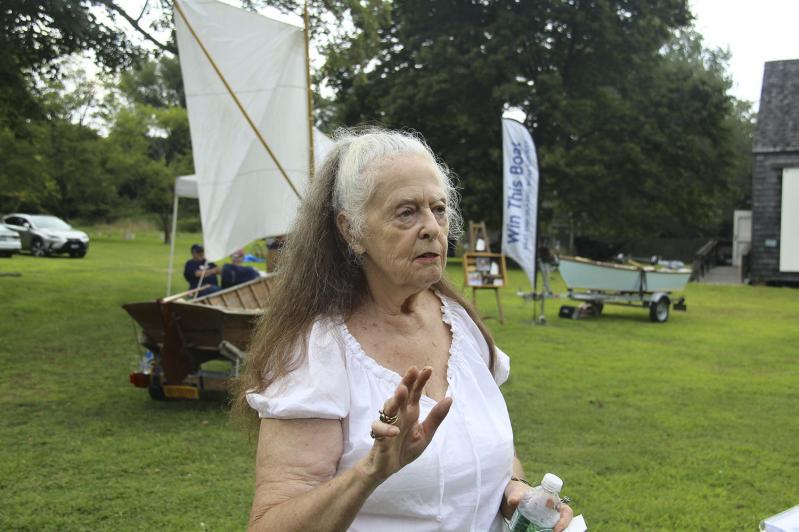Prudence Carabine’s family has lived in East Hampton for 12 generations, having arrived on one of the first European boats to hit the local shores in 1648, she said.
On Sunday, Ms. Carabine and a group of East Hampton and Springs residents held a gathering for the Sons and Daughters of East Hampton, a group of longtime Bonackers whose often huge families are interwoven with local history.
Sunday’s meeting was the first since before the Covid-19 pandemic, and it was held at the East Hampton Historical Farm Museum on North Main Street, which Ms. Carabine operates.
The group, which was previously known as the Lost Tribe of Accabonac, was originally formed in the 1970s as a reaction to the dwindling sense of community among the longtime Springs and East Hampton farming and fishing families. Originally, some 100 families would attend its gatherings.
“This place was a small town for 10 months of the year and very close-knit,” Ms. Carabine said. But over time, many people began to notice that they rarely felt the sense of community they had in previous years. The generational families watched the influx of wealth get larger and larger. The community “put up with that” because the growth offered work opportunities, such as building houses for newcomers. The local families “understood the value of what we have here in the environment and the community,” Ms. Carabine said. “There’s two separate cultures going on here, one of which does not touch base with reality very much and the other makes its living farming and fishing and mowing the lawns.”
“We’ve always had movie stars, we’ve always had writers, we’ve always had kings and queens from all over the world,” she added. “That was not unusual. What was unusual is that they suddenly decided they wanted to buy here or live here.” Previously, she said, the market was more “equitable” because the amount of money involved was much smaller.
Nonetheless, the original Lost Tribe of Accabonac expanded over the years, peaking at about 300 families attending the twice-a-year meetings.
Several years later, Ms. Carabine said, the New York Assembly passed new laws which placed restrictions on traditional Bonac fishing methods. While farming families like Ms. Carabine’s continued to flourish, fishing families struggled mightily.
After a string of fishing-related arrests because of the new laws, one of which involved singer Billy Joel, local fishermen were granted the opportunity to speak to the Assembly about the effect of the regulations on the Bonac lifestyle.
Ms. Carabine said that many of the people who traveled to Albany to defend their livelihood were not accustomed to speaking in public, maybe they were shy or felt more comfortable speaking up with some proverbial liquid courage.
The address to the Assembly failed to make a significant impact. One assemblyman reportedly told the group to go home and find different jobs. The restrictions on the fishing industry affected the town deeply, Ms. Carabine said.
“The fishermen had nothing to sell,” Ms. Carabine continued. “Many of them left angry and depressed, and never recovered. Some of them stayed and drank, and never recovered. It became a very sad milestone for our town.” The fishermen were told that they were “basically good for nothing” and “their way of life was worthless,” she said.
“It wasn’t a job, it was a way of life that was passed down,” Ms. Carabine said over the phone. The work on the boats was difficult. The boats would leave at about 3 or 4 a.m., shuttling a small group of men or women offshore to catch fish with a net.
The pandemic brought another wave of change. Many longtime residents took the “big bucks” and left, she said. Many moved down South. One man she knew of moved to Texas to work on an oil rig, returning every so often to fish.
“Our numbers began to diminish very quickly,” Ms. Carabine said, mentioning that the number of longtime locals here is down to about a third of what it was five years ago.
Community members began to ask Ms. Carabine about her interest in reviving the organization, whose old name felt dated and not “correct” in 2024.
At the Sons and Daughters of East Hampton event on Sunday, about 50 Bonackers gathered for a potluck. Inside the museum, birdhouses constructed by Jim Brooks were on display, all replicas of historic East Hampton buildings like The East Hampton Star and 1770 House.
Hugh King, the East Hampton Village historian, was also present at the gathering, and he crafted a series of questions about local history. Joanne Friedland Roberts showed a trailer for her documentary “The Bonackers,” which is about the local culture.
“Things change. We understand things change — 380 years, we know things change,” Ms. Carabine said. However, “we still feel that this is one of the most beautiful places on earth to live.”




